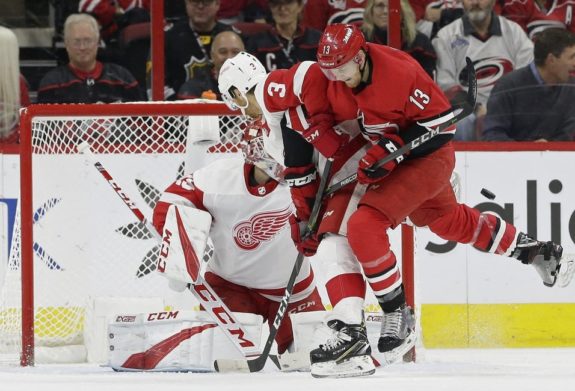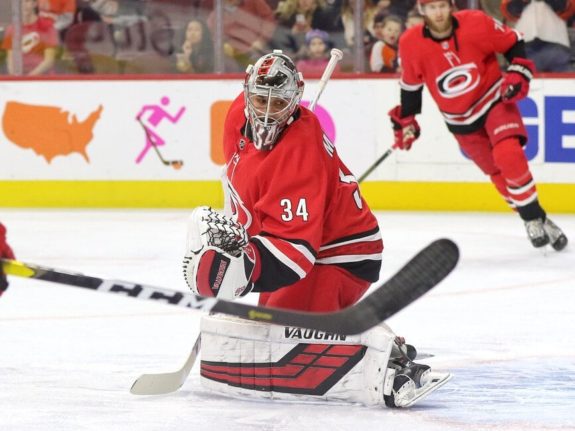The Carolina Hurricanes return home to face the defending Stanley Cup Champions Tampa Bay Lightning on Tuesday. As expected, COVID-19 has inserted itself and caused numerous changes and postponements, including the Hurricanes’ last three contests against the Nashville Predators and the Florida Panthers. As a result, the matchup with the Lightning will be just the third game of the Hurricanes’ season, we hope, before then taking on the runners-up Dallas Stars.
The time off may result in some rust build-up while the rest of the league plays on, but the postponements can also be a blessing in disguise, acting as a bye week of sorts to assess what went right and what went wrong in the first week of the season. Sitting at 2-1-0, there is a lot to be optimistic about, but the Hurricanes haven’t played perfectly by any means and will need to adjust before they play both 2020 Stanley Cup finalists in their next four games.
Second Period Woes
The Hurricanes are a team that starts the game hot — firing on all cylinders, getting into the offensive zone and getting clean shots. Carolina has outshot opponents 30-22 and have yet to allow a goal this season in opening periods. However, each game with a hot start eventually cools off, and the team’s ferocious play has shown trouble transferring to the second period of play.
The Hurricanes’ shot advantage quickly diminishes to 28-25 in second periods and have been outscored 2-1 — the only period where their goal differential is negative.
The lack of inconsistent play can be attributed to a few things, but the root cause is most likely the plan of attack; coming out lackadaisical can lead to immediate consequences in the fast-paced world of NHL hockey. The team often relies on the counterattack and does not get a lot of close chances at the net.

The Hurricanes have just a 5.3 shooting percentage this season in five-on-five, well below the league average of 7.7 percent, and has amassed just six total high-danger scoring chances in the offensive zone on the season. The lack of offensive consistency is the primary source for the team’s struggles, which accumulate in the second period after opposing teams adjust to Carolina’s initial onslaught to open the game.
The Hurricanes do typically rebound in the third period, outscoring opponents 7-4 with a remarkable 40-21 shot difference to close out games. If coaching is to be blamed for second-period woes, then head coach Rod Brind’Amour should also be praised for his adjustments in the third period to put the game away.
The second-period struggles have not resulted in any permanent damage early in the season, but with so few games and even more postponements, the Hurricanes can’t afford to let up even for a second. And every period counts.
Goalie Still a Problem
The Hurricanes’ defense has been spectacular through three games this season. Seemingly every player on the team has contributed to limit the shots and scoring chances in front of the net, and it has paid off well.
The Hurricanes are tied for the fourth-lowest goals allowed per game with 2.00 and have killed off 88.9 percent of power plays they have faced, good for eighth-best in the league. It’s a small sample size, but Carolina is playing defense worthy of a deep run in the playoffs if it can be sustained.
However, problems start to arise between the pipes. An expected issue after the front office balked at addressing the position during the offseason, the goaltender spot remains a big question mark even after two impressive team wins early in the season.
The Hurricanes opted to stick with their 1A-1B tandem of veterans Petr Mrázek and James Reimer, and they have both been as expected. Mrázek has been his usual, inconsistent self, following an impressive 14-save shutout in the first game of the season against the Detroit Red Wings with an ugly loss to the same team, allowing four goals on just 21 shots.

The 28-year-old goalie was given the starting spot to open the season, signaling an opportunity for Mrázek to distinguish himself as the primary starter on the team. However, he hasn’t shown anything to separate himself from his goalie counterpart thus far.
Reimer has been given just one start this season, but he took his opportunity and ran with it. Reimer’s 31-save performance in Monday’s win over Nashville matches Mrázek’s save total on the season with twice as many games played. The pendulum may have swung back in Reimer’s favor, and it won’t be surprising to see the 32-year-old goaltender back in net as Brind’Amour will likely stick with the hot hand when the team returns to play.
Faceoffs Falling Off
The Hurricanes’ hot start also was seen in the face-off dot.
Carolina won a torrid 56.9 percent of its face-offs in the opening game against Detroit, but that number has dropped each of the last two games, culminating in a paltry 35.3 percentage against the Nashville Predators last game. The Hurricanes’ inconsistency winning the puck battle allowed the Predators to put them on their heels for much of the game, allowing a season-high 33 shots. If not for solid defense and breakout play — which gave Sebastian Aho his first goal of the season — Carolina might be much worse off.
The Hurricanes’ long break may be a crossroads point that will be looked back with fondness or a major reason for regression, depending on how these next few games go. With just 53 games remaining in the schedule, every win counts, and improvements after a long break could be critical for a team looking to compete. Nevertheless, their matchups against the Lightning and Stars will provide pivotal tests to see how they stack up against some of the league’s best squads.